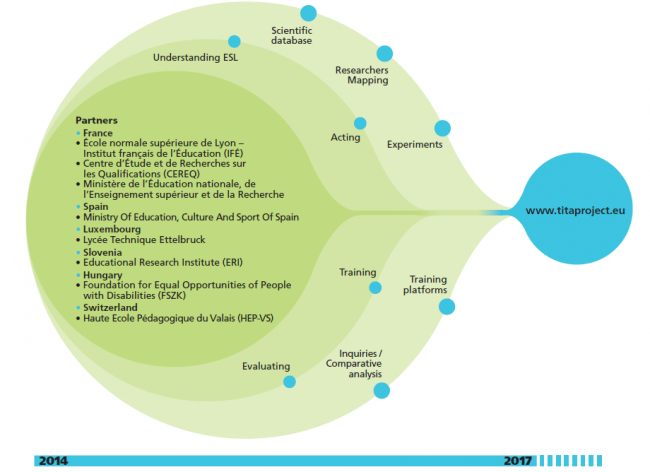

Training, Innovative Tools and Actions
fr “Early school leaving (ESL) is a multi-faceted and complex problem caused by a cumulative process of disengagement. It is a result of personal, social, economic, education or family-related reasons. Schools play an important role in addressing ESL but they cannot and should not work in isolation. Comprehensive approaches that focus on the root causes of ESL are required to reduce ESL.”
Reducing early school leaving : Key messages and policy support, Final Report of, November 2013, p.4.
http://ec.europa.eu/education/policy/strategic-framework/doc/esl-group-report_en.pdf
One of the key policy messages of the European Thematic Working Group identifying the critical conditions for successful policies against ESL is to “Promote and support multi-professional teams in schools to address ESL”.
TITA, « Team cooperation to fight early school leaving, Training, Innovative Tools and Actions », is a project dedicated to trainers, practitioners and stakeholders to provide scientific support, tools for action and training in order to prevent early school leaving from education and training (ELET). Three countries of the consortium (France, Luxembourg and Switzerland) are implementing local and multi-professional teams’ schools to set up measures addressing emerging difficulties at an early stage. Promoting the development of those teams appears to be one of the keys of successful strategies to reduce early school leaving (ESL), Therefore it is necessary to follow the experiments, analyse the difficulties, the levers of success and the impact of teamwork to reduce ESL and widespread the results of analyses, good practices and recommendations.
To work on ESL with other professionals and to set up student-centred measures, education staff needs to understand ESL and to develop or strengthen special skills. In this project, a scientific and comprehensive database on ESL is created and summaries are written for the local teams and their partners in an “easy to read” format. Local programs to support and train multi professional teams are experimented and analysed with researchers and Europeans trainers.
The aim of the project is double :
![]() Implementing and analysing the impact of new policies which consists in developing cross sectorial teams in schools
Implementing and analysing the impact of new policies which consists in developing cross sectorial teams in schools
![]() Professionalising the actors involved in the fight against ESL and realising tools for these actors. Europeans trainers will be associated at the analysis and at the production of the created tools
Professionalising the actors involved in the fight against ESL and realising tools for these actors. Europeans trainers will be associated at the analysis and at the production of the created tools
All the analysis, tools and results will be available on a website (http://titaproject.eu) dedicated to the project.
The outputs of the project will be :
Training, Innovative Tools and Actions
“Early school leaving (ESL) is a multi-faceted and complex problem caused by a cumulative process of disengagement. It is a result of personal, social, economic, education or family-related reasons. Schools play an important role in addressing ESL but they cannot and should not work in isolation. Comprehensive approaches that focus on the root causes of ESL are required to reduce ESL.”
Reducing early school leaving: Key messages and policy support, Final Report of, November 2013, p.4.
http://ec.europa.eu/education/policy/strategic-framework/doc/esl-group-report_en.pdf
One of the key policy messages of the European Thematic Working Group, which identifies the critical conditions for successful policies against ESL, is to “Promote and support multi-professional teams in schools to address ESL”.
TITA, « Team cooperation to fight early school leaving, Training, Innovative Tools and Actions », is a project dedicated to trainers, practitioners and stakeholders to provide scientific support, tools for action and training in order to prevent Early school Leaving from Education and Training (ELET). Three countries of the consortium (France, Luxembourg and Switzerland) are implementing local and multi-professional teams’ schools to set up measures addressing emerging difficulties at an early stage. Promoting the development of these teams appears to be one of the keys of successful strategies to reduce early school leaving (ESL). It is therefore necessary to follow the experiments, analyse the difficulties, the successful levers and the impact of teamwork on reducing ESL, and widespread the results of analyses, good practice and recommendations.
In order to work on ESL with other professionals and to set up student-centred measures, education staff needs to understand ESL and to develop or strengthen special skills. In this project, a scientific and comprehensive database on ESL is created and summaries are written for the local teams and their partners in an “easy to read” format. Local programs to support and train multi professional teams are experimented and analysed with researchers and Europeans trainers.
The aim of the project is twofold:
![]() Implementing and analysing the impact of new policies which consist in developing cross-sectoral teams in schools
Implementing and analysing the impact of new policies which consist in developing cross-sectoral teams in schools
![]() Professionalising the actors involved in the fight against ESL and realising tools for these actors. Europeans trainers are be associated with the analysis and with the production of the created tools
Professionalising the actors involved in the fight against ESL and realising tools for these actors. Europeans trainers are be associated with the analysis and with the production of the created tools
All analysis, tools and results will be available on a website (http://titaproject.eu) dedicated to the project.
The outputs of the project are :















